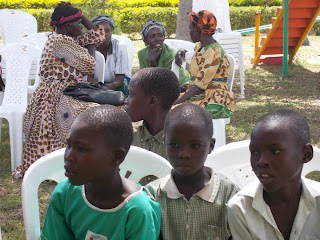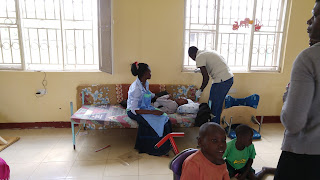My name is
HIV. I spend my time spreading from person to person bringing sickness and
despair. In Uganda I have a battle on my hands, because of TASO (The AIDS
Support Organisation). TASO spends his time telling people how to keep me away,
and how to fight against me if I get into their bodies. TASO even provides free
drugs to increase people’s capacity to live alongside me. I bring stigma with me. Stigma leads people
into fear and isolation, tells them no-one can ever love them and no-one will
want to be near them or share their lives. TASO tells them they have hope and a
future, TASO tells women they have special HIV nurses who can help them carry a
baby who will not have to live with me.
*I try to win
and take over people’s lives, leading them to sickness and death. People do not
want to be tested to see if I am there, they do not want their neighbours to
see them spend time with TASO and find out the truth. Many people cannot access TASO because they
don’t have transport, they are too sick to walk any distance, or TASO does not
have outreach clinics in their village.
Taking medication every day is hard, particularly for children and young
people. Young people become depressed,
believing they have no hope because people won’t want to employ them or marry
them. They stop taking their medicine.
Some even commit suicide.
I have another
enemy, Global Care (GC). GC loves vulnerable children so all their children are
tested by TASO, to see if I am there. If
they find HIV, TASO follows them up, GC gives them extra nutrition, helps the
family with healthcare costs, and makes sure children take regular medication. I am losing the battle with GC sponsored
children. However, I have a new friend.
Meet HepB
(Hepatitis B). HepB is starting to spread, and often targets my people – with HIV/AIDS.
People can be tested for HepB. If negative,
they can be vaccinated to keep HepB away. Many people cannot afford testing,
and more cannot afford even one vaccination, never mind the course of 3 they
need for full protection, or boosters. If they are positive, before they can
get treatment, they need further tests – which cost 100s of shillings. Even if they can afford the tests, they then
have to pay for medical counselling and a course of treatment. This is where
HepB really wins – HepB medication is not free. So, if someone with AIDS has
HepB, or someone poor, the future is bleak.
HepB is also
good at stigma and isolation. Many government
jobs require HepB testing. If you are positive, until you have completed a
course of treatment and been re-tested, you cannot work in health, catering, or
schools. Some people bribe unscrupulous
lab technicians to lie about results. We like them! HepB is easily passed from
person to person – much easier than me. HepB
is carried in sweat and saliva so the chances are that if HepB gets to one
person, the whole family will be infected. Hiding HepB is as deadly as hiding
me – if you can’t afford the tests and treatment, you will eventually have an
early death.
GC don’t
like HepB either. They test all their staff and children. They vaccinate if
results are negative, they pay for treatment if someone is positive. They have
tested over 140 children, plus family members. Tomorrow they are even
travelling to a school for the deaf to test sponsored children. These children
can’t get to the Soroti Centre. If the
children aren’t at school, they will visit homes and find them. They are
determined that HepB will not take any lives from their children. The staff at
GC went to fetch a child who is on crutches, rang schools, contacted parents,
made radio announcements – anything to reach their children.
A healthcare
worker said today, ‘It is better to be poor than have sickness in your family
in Uganda.’
We really win when poor people are sick.
*Please note, to my knowledge, none of the people in these photos have AIDS or HepB































